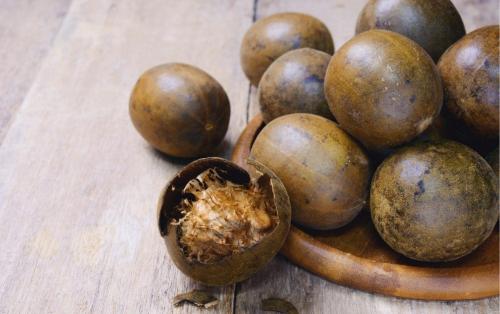All You Need To Know About Monk Fruit Sweeteners

Monk fruit sweeteners are the natural plant-based sweeteners which is obtained from monk fruit. They are completely free of calories and carbs. Read on to know its surprising health benefits, side-effects and substitute options.
What is Monk Fruit Sweeteners?
Monk fruit sweetener is made from the extracts of dried monk fruit. The extract is almost 150 to 250 times sweeter than that of the table sugar. It contains zero calories, zero carbohydrates and thus it doesn't raise your blood sugar levels.
Most non-nutritive sweeteners may lead to many health side effects like acid reflux, bloating, or allergic reactions. And some artificial sweeteners such as sucralose (available under brand names Equal and Splenda) are controversial. But, if we talk about monk fruit sweetener, there are no known side effects.
The Food and Drug Administration has declared monk fruit “generally recognized as safe (GRAS)” for everyone, including children and pregnant ladies.
Health Benefits of Monk Fruit:
Monk fruit health benefits may include:
1. Safe for Diabetes:
Monk fruit receive its great sweetness from natural compounds, called mogrosides. It’s generally safe for the diabetes patients because it doesn’t affect your blood sugar levels. Even so, drinks and foods sweetened with the monk fruit may include added sugars and other components that may boost the count of carbs and calories or affect insulin sensitivity.
Here, it is advisable don’t assume all products made from monk fruits are carb- and sugar-free.
2. Promotes Weight Loss:
Monk fruit has no calories, fat or carbs, so it may be a wow option for the individuals watching their waistline. You can save substantial carbs and calories by simply substituting monk fruit sweetener for the sugar (table) throughout the day. Again, make sure that you are taking monk fruit products that don’t have added sugars. And save treats made with monk fruit for special event or occasions because many still include diet-busting ingredients like chocolate or butter.
3. Anti-Inflammatory Properties:
According to a study held in 2011, monk fruit sweeteners has been used in TCM for hundreds of years to make hot drinks that help to cure sore throats and reduce phlegm. It contains some anti-inflammatory properties which help to reduce inflammation. It also may help to prevent cancer symptoms and keep your blood sugar levels stable.
Substitutes for Monk Fruit:
The best substitutes for monk fruit may include:
Stevia (a plant-based sweetener containing zero calories)
Sucralose: It normally comes under the brand names called Splenda and Equal. Sucralose is almost 100 times sweeter than monk fruit sweetener.
How to Use Monk Fruit Sweetener?
Monk fruit sweeteners can be used in many ways; including:
- Coffee
- Yogurt
- Oatmeal
- Hot tea or iced tea
- Sauces
- Desserts
- Smoothies
- Other Indian dishes such as kheer, etc.
What are The Side Effects of Monk Fruit?
Side effects include:
Monk fruit may cause allergic reactions. However, the side effects are rare, but you must take precautions and be careful while consuming monk fruit. Signs of allergic reaction may include:
- hives or rash
- difficulty breathing
- rapid or weak pulse
- dizziness
- swollen tongue
- stomach pain or vomiting
- wheezing
Advertise on APSense
This advertising space is available.
Post Your Ad Here
Post Your Ad Here

Comments